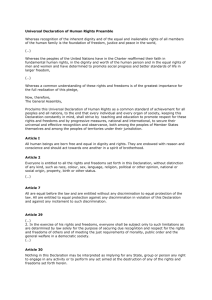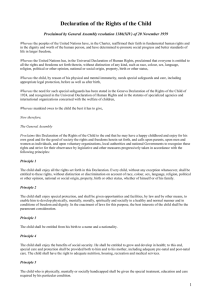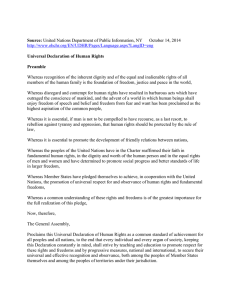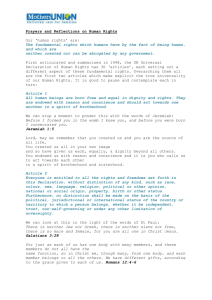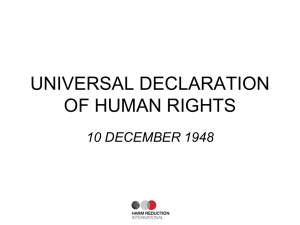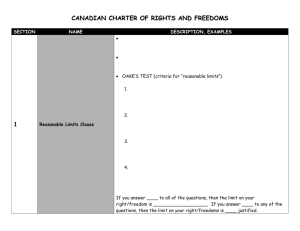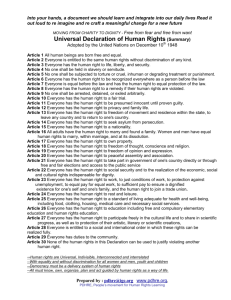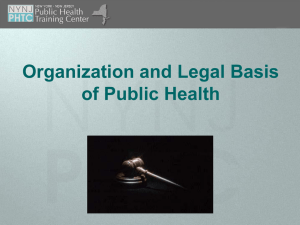Human Rights - David Field
advertisement
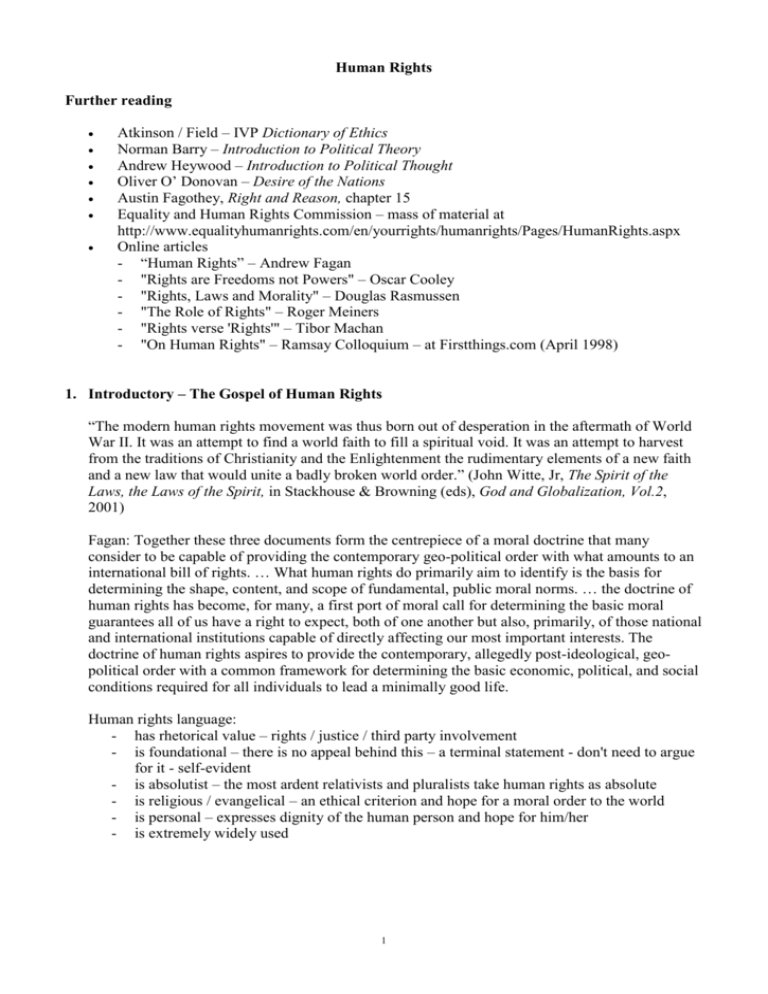
Human Rights Further reading Atkinson / Field – IVP Dictionary of Ethics Norman Barry – Introduction to Political Theory Andrew Heywood – Introduction to Political Thought Oliver O’ Donovan – Desire of the Nations Austin Fagothey, Right and Reason, chapter 15 Equality and Human Rights Commission – mass of material at http://www.equalityhumanrights.com/en/yourrights/humanrights/Pages/HumanRights.aspx Online articles - “Human Rights” – Andrew Fagan - "Rights are Freedoms not Powers" – Oscar Cooley - "Rights, Laws and Morality" – Douglas Rasmussen - "The Role of Rights" – Roger Meiners - "Rights verse 'Rights'" – Tibor Machan - "On Human Rights" – Ramsay Colloquium – at Firstthings.com (April 1998) 1. Introductory – The Gospel of Human Rights “The modern human rights movement was thus born out of desperation in the aftermath of World War II. It was an attempt to find a world faith to fill a spiritual void. It was an attempt to harvest from the traditions of Christianity and the Enlightenment the rudimentary elements of a new faith and a new law that would unite a badly broken world order.” (John Witte, Jr, The Spirit of the Laws, the Laws of the Spirit, in Stackhouse & Browning (eds), God and Globalization, Vol.2, 2001) Fagan: Together these three documents form the centrepiece of a moral doctrine that many consider to be capable of providing the contemporary geo-political order with what amounts to an international bill of rights. … What human rights do primarily aim to identify is the basis for determining the shape, content, and scope of fundamental, public moral norms. … the doctrine of human rights has become, for many, a first port of moral call for determining the basic moral guarantees all of us have a right to expect, both of one another but also, primarily, of those national and international institutions capable of directly affecting our most important interests. The doctrine of human rights aspires to provide the contemporary, allegedly post-ideological, geopolitical order with a common framework for determining the basic economic, political, and social conditions required for all individuals to lead a minimally good life. Human rights language: - has rhetorical value – rights / justice / third party involvement - is foundational – there is no appeal behind this – a terminal statement - don't need to argue for it - self-evident - is absolutist – the most ardent relativists and pluralists take human rights as absolute - is religious / evangelical – an ethical criterion and hope for a moral order to the world - is personal – expresses dignity of the human person and hope for him/her - is extremely widely used 1 2. Getting us thinking: a) An examination of the United Nations Declaration of Human Rights – see pp.5ff below b) Word-association and question-generation: - the right to roam - the right to life - the right to die - the right to privacy - the right to a fair trial - animal rights - the right to be called the children of God – John 1.12 - a woman’s right to choose (abortion) - the right to take along a believing wife – I Cor 9.5 c) Recurring ethical questions: - What exactly do you mean by … ? - Who says? - Where do you get that from ? - How do you know ? - What if someone disagrees ? - Aspiration or fact? d) Parenthetically, this raises questions about equality. See other handout. 3. Human Rights - some definitions, explanations, distinctions a) What are rights ? Definitions: - universal moral entitlements to be treated in certain ways or to have one’s interests taken into account - justified claims to the protection of persons’ important interests - just or lawful claims - immunities from harms / entitlements to goods - moral powers Structure: A has right to X against B by virtue of Y. A is the rights-holder (subject) X is the object of rights (matter) B is the duty-bearer (term) Y is the justifying ground of the right (title) Biblical Usage: (where English versions use words like “the right to” or “rights”) OT • • • mipat – just judgment - Deut 21.17, Job 36.6, Eccl 5.8, Is 10.2, Jer 5.28, Lam 3.35 edeq – justice – Psalm 82.3 dn – judgment, cause – Proverbs 31.5, 8, 9 Jer 5.28 2 • used in Engl to bring out meaning though no single corresponding word in Heb – Ex 21.9-10, Lev 25.29, 32, 48, Ruth 4.4, Est 8.11 • exesti – it is lawful – Matt 20.15 exousia – authority – Jn 1.12, I Cor 9.4-5, 18, II Thess 3.9 Rev 22.14 used in Engl to bring out meaning though no single corresponding word in Gk – I Cor 9.15, Gal 4.5, Rev 2.7, 3.21 (I will grant) NT • • Legitimate claim which others must observe. Often used wrt the poor. b) What are the different sorts of rights ? What secured by rights? “the fundamental prerequisites for each human being leading a minimally good life" "the goods necessary for human action" - freedom (negative / procedural) and wellbeing (positive / substantive) 1. Negative rights - freedoms from interference – the right not to be interfered with in respect of X (rape / slavery / theft) “virtually inviolate spheres of personal autonomy” - little circles - right of exclusion forbearance rights limitations on the powers of others over me – “no-one can stop me” the universal obligation upon others not to do/take something to/from me (negative duties) John Owen: “Neither can the second part of the choicest wisdom out of Christ attain the peculiar end whereunto it is appointed; and that is prudence in the management of civil affairs, — than which no perishing thing is more glorious, — nothing more useful for the common good of human kind. Now, the immediate end of this prudence is to keep the rational world in bounds and order, to draw circles about the sons of men, and to keep them from passing their allotted bounds and limits, to the mutual disturbance and destruction of each other. All manner of trouble and disturbance ariseth from irregularity: one man breaking in upon the rights, usages, interests, relations of another, sets this world at variance. The sum and aim of all wisdom below is, to cause all things to move in their proper sphere, whereby it would be impossible there should be any more interfering than is in the celestial orbs, notwithstanding all their divers and various motions: to keep all to their own allotments, within the compass of the lines that are fallen unto them, is the special end of this wisdom.” (Works, vol 2, p.115) 2. Positive rights - entitlement to goods welfare rights obligation upon others (whichothers ?) to do/provide something for me (affirmative duties) 3 Note the asymmetry between negative and positive rights. If I do nothing then you have all of your negative rights from me. But for you to have all of your positive rights it may be necessary to take something from me – which may, in turn, be an infringement of my negative rights. “it would have been better if the human goods specified in the last six articles had been described as our duties of solidarity rather than as the rights of others. We can always not do the wrong that is not to be done (such as violating the rights of others); we cannot always do the good that we ought to do or want to do (such as ensuring basic economic goods for all).” (“On Human Rights” in First Things, April 1998, p.18) c) How do rights work and where do they come from ? - legal or moral ? realities ‘out there’ – embedded in the nature of things which we must recognise and implement (natural rights)? contractual obligations (an actual or supposed contract) ? conditional or unconditional ? hierarchy of rights ? (what happens when rights conflict ?) the ground / source of rights is one of the ultimate questions 4. Is rights language redundant ? And maybe even dangerous / unhelpful ? Bentham: "nonsense on stilts" Isn’t the assertion of a right to the rights-holder (A) merely the mirror image way of stating the duty of the duty-holder (B)? Your right to life is my duty to not kill you. My right to education is someone’s duty to provide me with an education. And so on ? And isn’t the Biblical emphasis so much more upon responsibilities and obligations that rightslanguage encourages selfishness or a victim-mentality / blame-frame ? Again, the elevation of a person’s need for something which others have a duty to give him/her (food to the hungry) into a “right” may be used to justify third-party coercive intervention. 5. Human rights – Biblical questions and emphases a) what rights do we have before God ? 1. none ? this to assert our radical dependence upon grace even for existence; and our being the property of God with which he can do just as he pleases - Ps 24, Matt 20, Rom 9, Is 4048 2. certainties about what I will get from God – which arise from his perfectly righteousness character: - a fair trial - oncondit - God's character - forgiveness if I believe in Jesus Christ - promises - worth of the human person - his image; no delight in destruction. This is all God-centred - guarantees our comfort not at all! 4 b) what other biblical truths might rights language express ? 1. absoluteness of God’s demands upon us - but is the best way? (I am the LORD) 2. confidence in God’s legal ‘protection’ of me – my right to a fair trial before God shd be expressed in the conduct of human courts - this is true of all duties 3. what are my responsibilities / duties to others – what can they ‘expect’ from a righteous man / woman ? - don't dull the sense of outrage that the world is not right 4. willingness to forego certain ‘rights’ for the sake of the Kingdom - Phil 2, I Cor 9 6. On what grounds might we want to argue for continued and careful use of rights language ? 1. 2. 3. 4. 5. 6. focus upon the rights-holder is a way of upholding moral dignity and a way of “seeing things from the other side” rights language may be used for highest social duties – life, property etc. or to focus upon the justification for the claim – it is no mere benefit or interest encourages a proper sense of “expectation” about how the world should work may be a tactical tool – e.g. use UN 18 7. Distinguish - human rights as moral concept and human rights as false gospel: God-less human rights as the hope for the world … 1. 2. 3. 4. 5. 6. 7. what is a human right ? how can we know what should be on the list ? what is the moral basis for human rights ? what are the different sorts and what if they conflict ? what do they add to our moral understanding ? what moral message does the HRG send ? - life can be true, full and rich without God - other people are threats and debtors how likely is it that this gospel can save the world ? John 13 Philippians 2 5 Indefinable Unidentifiable Ungrounded Self-contradictory Redundant Misleading Hopeless UNIVERSAL DECLARATION OF HUMAN RIGHTS Adopted and proclaimed by UN General Assembly Resolution 217 A (III) of 10 December 1948 Preamble Whereas recognition of the inherent dignity and of the equal and inalienable rights of all members of the human family is the foundation of freedom, justice and peace in the world, Whereas disregard and contempt for human rights have resulted in barbarous acts which have outraged the conscience of mankind, and the advent of a world in which human beings shall enjoy freedom of speech and belief and freedom from fear and want has been proclaimed as the highest aspiration of the common people, Whereas it is essential, if man is not to be compelled to have recourse, as a last resort, to rebellion against tyranny and oppression, that human rights should be protected by the rule of law, Whereas it is essential to promote the development of friendly relations between nations, Whereas the peoples of the United Nations have in the Charter reaffirmed their faith in fundamental human rights, in the dignity and worth of the human person and in the equal rights of men and women and have determined to promote social progress and better standards of life in larger freedoms, Whereas member States have pledged themselves to achieve, in co-operation with the United Nations, the promotion of universal respect for and observance of human rights and fundamental freedoms, Whereas a common understanding of these rights and freedoms is of the greatest importance for the full realization of this pledge, Now therefore: The General Assembly Proclaims this Universal Declaration of Human Rights as a common standard of achievement for all peoples and all nations, to the end that every individual and every organ of society, keeping this Declaration constantly in mind, shall strive by teaching and education to promote respect for these rights and freedoms and by progressive measures, national and international, to secure their universal and effective recognition and observance, both among the peoples of member States themselves and among the peoples of territories under their jurisdiction. Article 1 - All human beings are born free and equal in dignity and rights. They are endowed with reason and conscience and should act towards one another in a spirit of brotherhood. Article 2 - 1. Everyone is entitled to all the rights and freedoms set forth in this Declaration, without distinction of any kind, such as race, colour, sex, language, religion, political or other opinion, national or social origin, property, birth or other status. 2. Furthermore, no distinction shall be made on the basis of the political, jurisdictional or international status of the country or territory to which a person belongs, whether it be independent, trust, non-self-governing or under any other limitation of sovereignty. Article 3 - Everyone has the right to life, liberty and security of person. Article 4 - No one shall be held in slavery or servitude; slavery and the slave trade shall be prohibited in all their forms. Article 5 - No one shall be subjected to torture or to cruel, inhuman or degrading treatment or punishment. Article 6 - Everyone has the right to recognition everywhere as a person before the law. Article 7 - All are equal before the law and are entitled without any discrimination to equal protection of the law. All are entitled to equal protection against any discrimination in violation of this Declaration and against any incitement to such discrimination. 6 Article 8 - Everyone has the right to an effective remedy by the competent national tribunals for acts violating the fundamental rights granted him by the constitution or by law. Article 9 - No one shall be subjected to arbitrary arrest, detention or exile. Article 10 - Everyone is entitled in full equality to a fair and public hearing by an independent and impartial tribunal, in the determination of his rights and obligations and of any criminal charge against him. Article 11 - 1. Everyone charged with a penal offence has the right to be presumed innocent until proved guilty according to law in a public trial at which he has had all the guarantees necessary for his defence. 2. No one shall be held guilty of any penal offence on account of any act or omission which did not constitute a penal offence, under national or international law, at the time when it was committed. Nor shall a heavier penalty be imposed than the one that was applicable at the time the penal offence was committed. Article 12 - No one shall be subjected to arbitrary interference with his privacy, family, home or correspondence, nor to attacks upon his honour and reputation. Everyone has the right to the protection of the law against such interference or attacks. Article 13 - 1. Everyone has the right to freedom of movement and residence within the borders of each State. 2. Everyone has the right to leave any country, including his own, and to return to his country. Article 14 - 1. Everyone has the right to seek and to enjoy in other countries asylum from persecution. 2. This right may not be invoked in the case of prosecutions genuinely arising from non-political crimes or from acts contrary to the purposes and principles of the United Nations. Article 15 - 1. Everyone has the right to a nationality. 2. No one shall be arbitrarily deprived of his nationality nor denied the right to change his nationality. Article 16 - 1. Men and women of full age, without any limitation due to race, nationality or religion, have the right to marry and to found a family. They are entitled to equal rights as to marriage, during marriage and at its dissolution. 2. Marriage shall be entered into only with free and full consent of the intending spouses. 3. The family is the natural and fundamental group unit of society and is entitled to protection by society and the State. Article 17 - 1. Everyone has the right to own property alone as well as in association with others. 2. No one shall be arbitrarily deprived of his property. Article 18 - Everyone has the right to freedom of thought, conscience and religion; this right includes freedom to change his religion or belief, and freedom, either alone or in community with others and in public or private, to manifest his religion or belief in teaching, practice, worship and observance. Article 19 - Everyone has the right to freedom of opinion and expression; this right includes freedom to hold opinions without interference and to seek, receive and impart information and ideas through any media and regardless of frontiers. Article 20 - 1. Everyone has the right to freedom of peaceful assembly and association. 2. No one may be compelled to belong to an association. Article 21 - 1. Everyone has the right to take part in the government of his country, directly or through freely chosen representatives. 2. Everyone has the right to equal access to public service in his country. 3. The will of the people shall be the basis of the authority of government; this will shall be expressed in periodic and genuine elections which shall be by universal and equal suffrage and shall be held by secret vote or by equivalent free voting procedures. Article 22 - Everyone, as a member of society, has the right to social security and is entitled to realization, through national effort and international co-operation and in accordance with the organization and resources of each State, of the economic, social and cultural rights indispensable for his dignity and the free development of his personality. 7 Article 23 - 1. Everyone has the right to work, to free choice of employment, to just and favourable conditions of work and to protection against unemployment. 2. Everyone, without any discrimination, has the right to equal pay for equal work. 3. Everyone who works has the right to just and favourable remuneration ensuring for himself and his family an existence worthy of human dignity, and supplemented, if necessary, by other means of social protection. 4. Everyone has the right to form and to join trade unions for the protection of his interests. Article 24 - Everyone has the right to rest and leisure, including reasonable limitation of working hours and periodic holidays with pay. Article 25 - 1. Everyone has the right to a standard of living adequate for the health and well-being of himself and of his family, including food, clothing, housing and medical care and necessary social services, and the right to security in the event of unemployment, sickness, disability, widowhood, old age or other lack of livelihood in circumstances beyond his control. 2. Motherhood and childhood are entitled to special care and assistance. All children, whether born in or out of wedlock, shall enjoy the same social protection. Article 26 - 1. Everyone has the right to education. Education shall be free, at least in the elementary and fundamental stages. Elementary education shall be compulsory. Technical and professional education shall be made generally available and higher education shall be equally accessible to all on the basis of merit. 2. Education shall be directed to the full development of the human personality and to the strengthening of respect for human rights and fundamental freedoms. It shall promote understanding, tolerance and friendship among all nations, racial or religious groups, and shall further the activities of the United Nations for the maintenance of peace. 3. Parents have a prior right to choose the kind of education that shall be given to their children. Article 27 - 1. Everyone has the right freely to participate in the cultural life of the community, to enjoy the arts and to share in scientific advancement and its benefits. 2. Everyone has the right to the protection of the moral and material interests resulting from any scientific, literary or artistic production of which he is the author. Article 28 - Everyone is entitled to a social and international order in which the rights and freedoms set forth in this Declaration can be fully realized. Article 29 - 1. Everyone has duties to the community in which alone the free and full development of his personality is possible. 2. In the exercise of his rights and freedoms, everyone shall be subject only to such limitations as are determined by law solely for the purpose of securing due recognition and respect for the rights and freedoms of others and of meeting the just requirements of morality, public order and the general welfare in a democratic society. 3. These rights and freedoms may in no case be exercised contrary to the purposes and principles of the United Nations. Article 30 - Nothing in this Declaration may be interpreted as implying for any State, group or person any right to engage in any activity or to perform any act aimed at the destruction of any of the rights and freedoms set forth herein. 8
